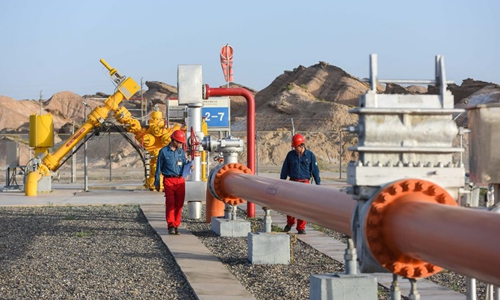HOME >> SOURCE
Little scope for oil import surge in China as domestic demand weakens amid pandemic
By GT staff reporters Source:Global Times Published: 2020/4/6 19:38:40
Weak domestic demand amid pandemic: experts

Staff members work at Kela-2 gas field of the Tarim Oilfield in Aksu, northwest China's Xinjiang Uygur Autonomous Region. Photo: Xinhua
China may not undertake large-scale oil imports in the near future, insiders and industry experts said, citing limited state reserve capacity, lethargic domestic demand and the worsening global pandemic.
The central government and enterprises may adopt a wait-and-see attitude as the outlook for demand remains uncertain, experts predicted.
The comments come as Saudi Arabia and Russia are reportedly close to a deal on Monday to cut output, raising hopes that their month-long price war may end and global oil prices may bounce back after hitting a 17-year low.
"The scope for large-scale oil imports is very limited," especially after China made big purchases in recent months as petroleum prices plummeted, Lin Boqiang, director of the China Center for Energy Economics Research at Xiamen University, told the Global Times on Monday.
"Reserve facilities for both the government and companies may have limited space to store any large imports at the moment," Lin said.
Customs data showed that in the first two months of this year, oil imports rose 16.7 percent by value year-on-year, although overall imports fell 2.4 percent due to the outbreak of COVID-19.
In the January-February period, imports from top supplier Saudi Arabia rose 26 percent and purchases from Russia gained 11 percent, while imports from the US remained at zero, calculations by Reuters showed.
Lin cautioned that although not all of the oil imports went into China's reserves - some may have been exported to Southeast Asian countries in the form of refined products - the combination of surging imports and weakening demand may indicate that much of the nation's reserve facilities are almost full.
While China has intensified efforts to expand state petroleum reserve sites, the country's storage capacity remains smaller than that of other major oil consumers, insiders said.
According to an article on the website of China National Petroleum Corp, China is expected to keep increasing its capacity for strategic petroleum reserves to 503 million barrels by the end of this year with the construction of its third group of strategic reserve sites.
The US Strategic Petroleum Reserve currently holds about 635 million barrels of oil.
In response to the tumbling international oil market, OPEC and its allies are working on a global agreement for an unprecedented production cut. A virtual meeting that was to have taken place on Monday was delayed to Thursday. But analysts are concerned whether the meeting could really work.
Steivan Defilla, president assistant of the APEC Sustainable Energy Center, told the Global Times that it is unsure if the OPEC meeting will result in higher oil prices, as "this depends not only on whether OPEC countries can actually agree on reduction targets, but also whether they will abide by their targets afterwards, and whether all non-OPEC producers will participate in similar production cuts."
If the five smallest oil producers in the world refuse to participate in production cuts and offset the cuts made by all others, prices will stay low, Defilla said.
Even if major global oil suppliers reach a consensus on cutting output, crude prices may remain at comparatively low levels, as global demand - especially in the US - is declining amid the pandemic, so China will not be in any rush to buy, Lin said.
Newspaper headline: No room for oil import surge
Posted in: INDUSTRIES